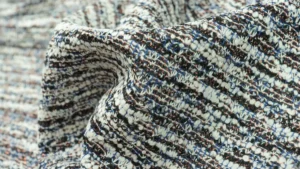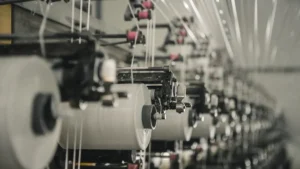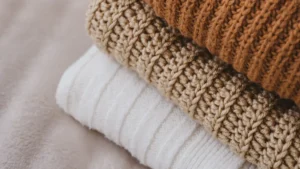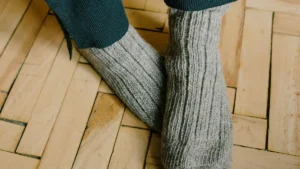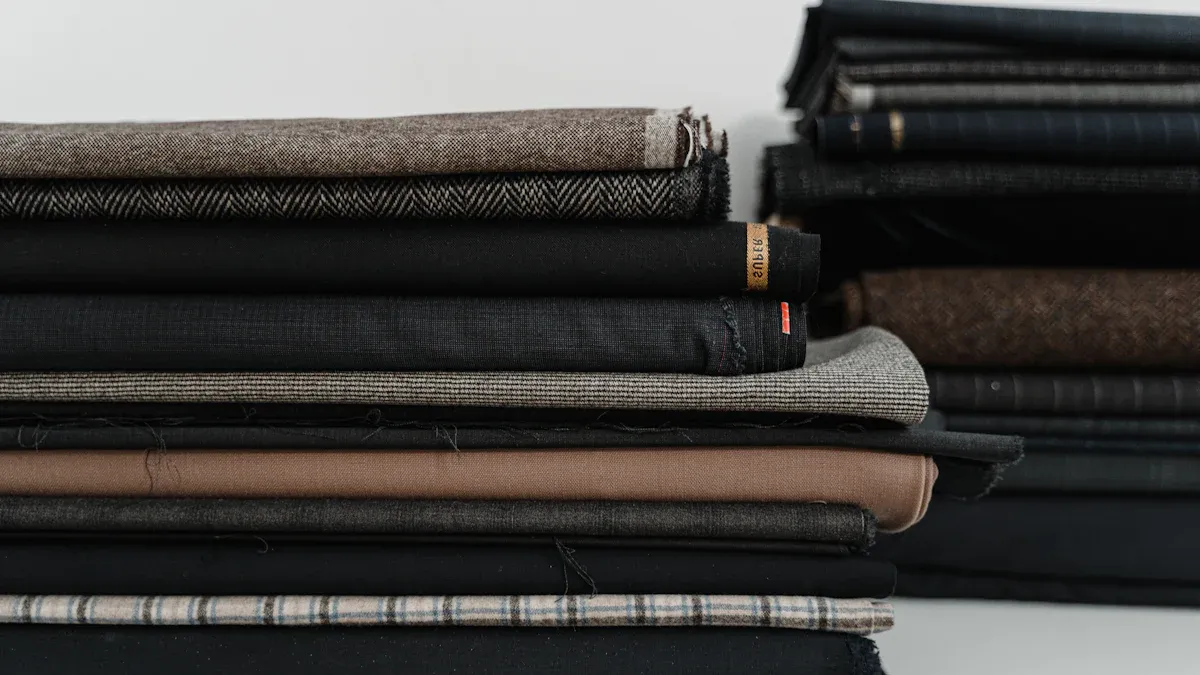
Wool suiting fabric is a top pick for making suits. It feels soft and looks fancy. You can tell it is high quality right away. Wool comes from sheep. It feels nicer than most other materials. This fabric is special because of what it can do.
Wool suiting fabric lets air pass through in all seasons. It does not wrinkle easily. It can even keep water away because of natural lanolin.
Wool suiting keeps its shape well. It feels smooth and lasts a long time. Your suit will look good for years, so it is a smart buy.
A suit made from wool suiting fabric looks classic. It feels rich and works for any event. If you pick wool, you get a suit with tradition, strong quality, and a bit of luxury in every part.
Key Takeaways
Wool suiting fabric feels soft and looks fancy. It works well in every season. This is because it lets air pass through and does not wrinkle easily. Merino wool is the softest and most comfy kind. It is great for suits that keep you cool in summer. It also keeps you warm in winter. Wool suits last a long time and keep their shape. They do not stain or smell easily. Wool suits look classic and stylish for many events. Picking wool instead of fake fabrics helps the planet. Wool is natural, can be replaced, and breaks down in nature. Taking care of your wool suit is important. Brush it gently, air it out, and dry clean it sometimes. This keeps your wool suit fresh and looking nice for years.
Wool Suiting Fabric Overview
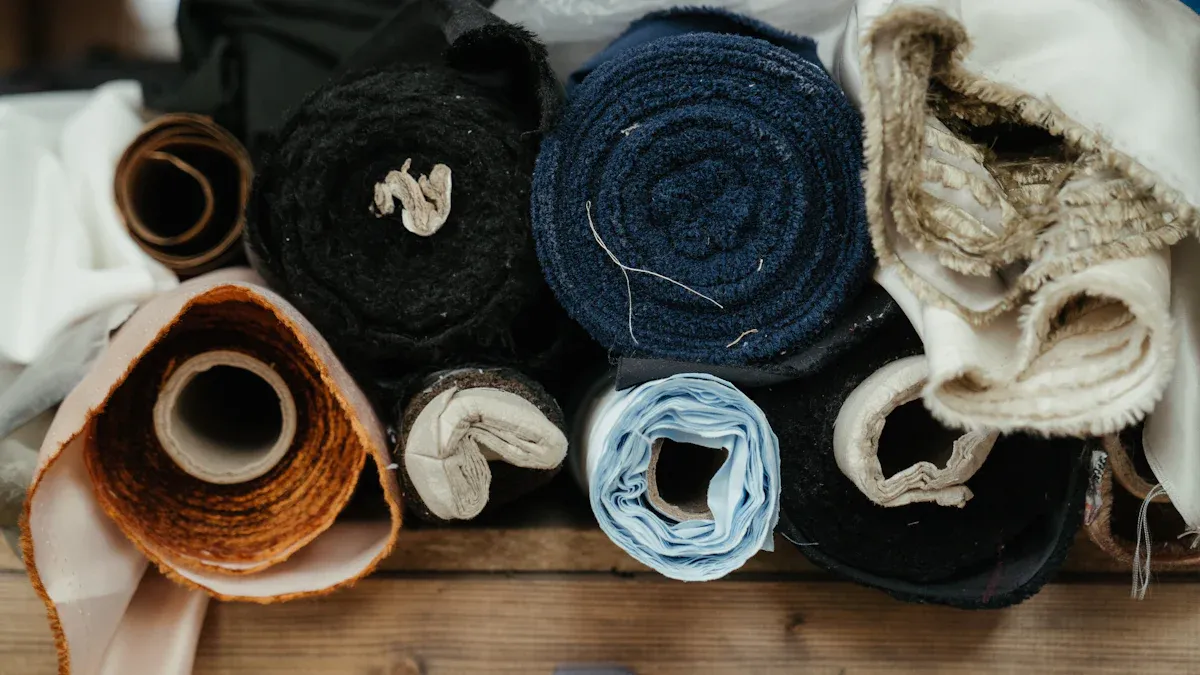
What Is Wool Suiting Fabric
You might wonder why wool suiting fabric is so good for suits. Wool suiting fabric is a textile made mostly from animal hair fibers, mainly from sheep. Merino sheep give the softest and smoothest wool. Some wool suit fabrics also use fibers from goats, alpacas, or camels. Wool fibers are made of protein and have a natural crimp. This crimp traps air, so the fabric feels warm and comfy.
Wool suit fabric for men often uses Merino wool because it is soft and fine. The process starts with cleaning and sorting the wool. Workers card and spin the fibers into yarn. Then, they weave the yarn into wool fabric. This is how wool fabric is made. The finished fabric is strong, smooth, and flexible, which makes it great for suits.
The textile industry uses strict rules to define wool suiting fabric. These rules come from the Wool Products Labeling Act and international standards. The table below shows how experts grade wool suit fabrics:
Super Grade | Maximum Fiber Diameter (microns) | Quality Level |
|---|---|---|
Super 80’s | 19.75 | Standard Fine |
Super 100’s | 18.75 | Finer |
Super 120’s | 17.75 | Very Fine |
Super 150’s | 16.75 | Extra Fine |
Super 180’s | 15.75 | Ultra Fine |
Super 250’s | 11.25 | Rarest, Finest |
Higher Super numbers mean the fibers are finer and feel softer. Wool suit fabrics with higher Super grades are used for fancy suits.
How Wool Suiting Differs from Other Fabrics
When you pick a suit, you will see that wool suiting stands out. Wool fabric looks classic and neat. It comes in many weights, so you can wear it in summer or winter. Wool suiting fabric is medium weight and works well for jackets and pants. Wool suit fabric for men keeps its shape and does not wrinkle much.
Let’s look at how wool suiting fabric compares to other suit materials:
Fabric Type | Comfort | Breathability | Wrinkle Resistance | Maintenance | Notes | |
|---|---|---|---|---|---|---|
Wool | High | High | Excellent | Natural | Dry clean | Luxurious, year-round |
Cotton | Moderate | High | Good | Low | Easy care | Best for casual use |
Linen | Low | High | Excellent | Low | Easy care | Best for warm weather |
Synthetic | High | Moderate | Poor | High | Easy care | Less breathable |
Wool Blends | High | High | Good | High | Easier care | Balanced qualities |
Wool suit fabrics last longer than cotton or linen. Wool fabric does not wear out fast, so your suit stays nice. Cotton suits are soft and let air through but wrinkle easily. Linen suits are very light and cool but wrinkle fast and look more casual. Synthetic fabrics cost less and do not wrinkle, but they do not breathe well and can feel stiff. Wool suiting fabric gives you softness, structure, and breathability.
You will also see differences in how the fabrics look and feel. Wool suit fabrics, like worsted wool, look smooth and fancy. Cotton and linen feel soft but do not have the same luxury or structure as wool. Linen looks wrinkled and casual, while synthetics can look shiny or flat. Wool fabric stands out because it is made from natural fibers, lets air through, and has a classic style.
If you ask, “how is wool fabric used?” you will find it in suits, blazers, and trousers. Wool suiting is good for business and special events. Wool suit fabrics are also used in uniforms and high fashion. Wool is a natural fiber, so it is renewable and breaks down in nature. This makes it a smart choice for the planet.
Tip: If you want a suit that lasts, feels good, and looks sharp, pick wool suiting fabric. You get a natural fiber and a classic style that always looks good.
Characteristics of Wool Fabrics
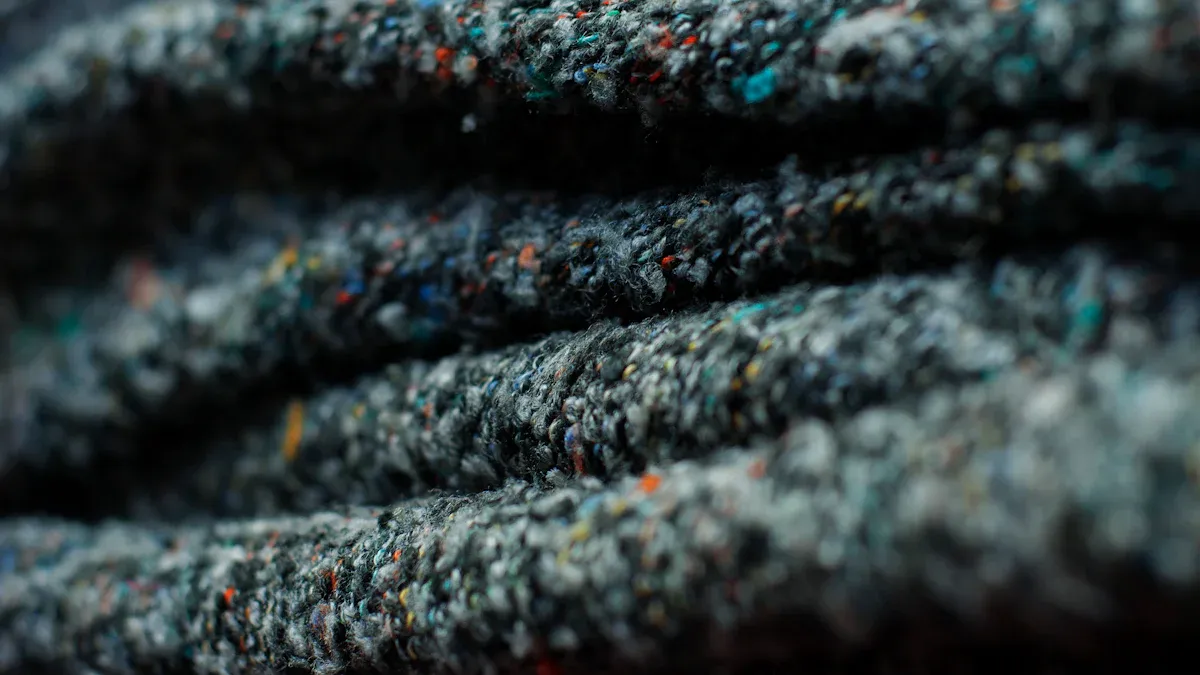
Properties of Wool
You will notice that the properties of wool make it perfect for a suit. Wool fabric stands out because it is breathable, warm, and strong. The natural crimp in wool fibers creates tiny air pockets. These pockets help trap heat when it is cold and let air flow when it is warm. This means you stay comfortable in your suit all year. Wool suit fabrics also have moisture wicking properties. They can absorb up to 30% of their weight in water without feeling wet. This keeps you dry and fresh, even during long days.
Here are some key properties of wool fabric:
Breathability for all seasons
Heat retention for warmth
Moisture-wicking to keep you dry
Elasticity for shape and fit
Durability for long-lasting wear
Wool suit fabrics resist stains and odors, so your suit stays clean and fresh. You will find that these properties of wool add to your comfort and make your suit easy to care for.
Structure and Drape
Wool fabric gives your suit a great fit and look. The structure of wool fibers allows the fabric to bend and move without breaking. Wool suit fabrics hold their shape well, so your suit always looks sharp. The natural drape of wool fabric means it hangs smoothly and flatters your body. Medium-weight wool suit fabrics, like worsted wool, offer a balance between structure and flow. This balance helps your suit feel comfortable and look neat.
The microscopic scales on wool fibers add to the flexibility. Wool fabric can bend up to 20,000 times before breaking. This makes wool suit fabrics both strong and comfortable. The air spaces in the fibers help with breathability and moisture control, adding to the comfort of your suit.
Wrinkle and Flame Resistance
You will appreciate how wool suit fabrics resist wrinkles. The crimp and elasticity in wool fibers help the fabric bounce back after creasing. Wool fabric can be reshaped with steam, so your suit keeps its neat look. The twill weave used in many wool suit fabrics adds to this wrinkle resistance.
Wool also offers natural flame resistance. It does not catch fire easily and will self-extinguish if the flame source is removed. Unlike some synthetic fabrics, wool fabric will not melt. Instead, it chars, which helps protect you. This makes wool suit fabrics a safe choice for your suit.
Note: Wool suit fabrics combine comfort, durability, and safety, making them a top pick for any suit.
Types of Wool Suiting
Merino and Other Wool Types
When you look at wool suit fabrics, you will see many types of wool. Merino wool stands out as the softest and most comfortable. You will notice that merino wool comes from merino sheep, which have very fine and smooth fibers. This makes merino wool perfect for suiting when you want a soft feel and great temperature control. Merino wool also wicks moisture well, so you stay dry and comfortable.
Here are some common types of wool used in suiting:
Merino wool: Soft, fine, and great for comfort.
Worsted wool: Smooth, strong, and classic for suits.
Tropical wool: Made from merino wool, light and cool for hot weather.
Cashmere: Very soft and light, but less common in suiting.
Camel hair: Warm and soft, often blended with other wool.
Angora wool: Fluffy and warm, but rare in wool suit fabrics.
You will find that merino wool costs more than regular wool because it feels softer and lasts longer. Merino wool fibers bend easily, so they do not itch your skin. Other wool types, like lambswool, are softer than standard wool but not as fine as merino wool.
Worsted Wool Suiting
Worsted wool suit fabrics use long, straight fibers. Workers comb these fibers so they line up and remove the short pieces. This process makes worsted wool smooth, strong, and shiny. You will see that worsted wool suit fabrics drape well and resist wrinkles. These qualities make worsted wool the top choice for formal suiting.
Woollen fabric, on the other hand, uses shorter fibers that are brushed in different directions. This makes the fabric softer, warmer, and a bit fuzzy. Woollen fabric works well for casual clothes but does not have the crisp look of worsted wool suit fabrics.
Super numbers tell you how fine the worsted wool fibers are. Higher Super numbers mean the fibers are thinner and the fabric feels softer. However, very high Super numbers can make the fabric more delicate. For everyday suits, you might want a lower Super number for better durability.
Weaves in Wool Suiting
The weave of wool suit fabrics changes how your suit looks and feels. The most common weave is twill. Twill has a diagonal pattern that gives the fabric strength and helps it drape nicely. Herringbone is a type of twill with a zigzag pattern. You will notice that herringbone adds texture and style to your suit while keeping it strong and flexible.
Here is a table showing common weaves in wool suit fabrics:
Weave Type | Appearance | Best Use |
|---|---|---|
Twill | Diagonal lines | Classic suits, trousers |
Herringbone | Zigzag pattern | Stylish suits, jackets |
Plain Weave | Simple, flat texture | Jackets, less formal suiting |
Satin Weave | Smooth, shiny surface | Evening wear, formal suiting |
Twill and herringbone weaves help your suit resist wrinkles and keep its shape. You get a suit that looks sharp and feels comfortable for any event.
Benefits and Care of Wool Suiting
Why Choose Wool Suiting
A wool suit gives you more than just a nice look. Wool, like merino wool, keeps you comfy all year. You stay cool in summer and warm in winter. Merino fibers let air move and help control heat. This makes merino wool suits good for any season. Merino wool also pulls sweat away, so you feel dry and fresh.
Here are some reasons to pick wool instead of polyester blends:
Wool lets air move, so you do not get too hot.
Merino wool suits keep you comfy in any weather.
Wool is a natural fiber, but polyester comes from oil.
Wool suits look fancy and feel soft for a classic style.
Merino wool suits last longer and get better with age if you care for them.
Benefit Category | Wool Suiting Fabric Advantages |
|---|---|
Comfort & Breathability | Wool lets air move and pulls sweat away, so you feel good in hot or cool weather. |
Appearance & Drape | Wool feels soft and smooth, and fits your body well, making you look great. |
Formal Look | Wool has a classic look that works for fancy events and looks grown-up. |
Durability & Longevity | Wool lasts a long time and gets better if you take care of it; it is a smart buy. |
Environmental Impact | Wool is a natural fiber, so it is better for the planet than polyester. |
Suitability for Occasions | People pick wool suits for weddings, big meetings, and important jobs because they look nice. |
Temperature Regulation | Wool lets air move and helps control heat, so you do not get too hot or sweaty. |
When you pick merino wool, you help the earth. Wool grows back and breaks down in nature. Polyester can pollute water and does not break down.
Choosing the Right Wool Suiting Fabric
You want your suit to fit your life and style. Merino wool suits feel good and work for many events. Think about how heavy the fabric is. Light merino wool suits (7-9 oz) feel cool and are good for summer. Medium merino wool suits (10-12 oz) work for most of the year. Heavy merino wool suits (13+ oz) keep you warm in winter.
The way the fabric is woven matters too. Twill weaves make the suit strong and warm. Herringbone gives your suit a classic look. Plain weaves look smooth and are good for work. Pick a color that fits your style and the event. Navy and charcoal merino wool suits always look good for work or special days.
Tip: Pick wool with a super number that matches what you need. Higher super numbers mean softer merino wool, which is great for special days. Lower super numbers make a stronger suit for everyday use.
Care and Maintenance
Taking care of your merino wool suit keeps it looking nice and feeling good. Use a soft brush after you wear it to get rid of dust. Hang your suit on a wooden hanger to keep its shape. Let your merino wool suit air out after wearing so it stays fresh.
Follow these steps for best results:
Dry clean your suit only when you need to, about every 4–6 wears.
Clean stains right away with a wet cloth.
Use a steamer to get rid of wrinkles, not an iron.
Keep your suit in a cool, dry place in a cotton bag.
Switch between your merino wool suits so each one gets a break.
Do not wash your suit in hot water or use strong soaps. Never dry your suit near heat or in the sun. These steps protect the wool and keep your merino wool suit looking great. If you care for it, your wool suit will last for years and keep its comfort and style.
You want a suit that feels good, looks sharp, and lasts for years. Wool suiting fabric, especially merino and merino wool, gives you all these benefits. Merino wool suits keep you comfortable in every season. You get warmth in winter and coolness in summer. Merino fibers trap air, so your suit stays light and soft. Your suit resists wrinkles and keeps its shape. Merino wool suits also wick away moisture, so you stay dry. You can wear your suit for work or special events. Merino wool suits come in many styles and colors. You find classic navy or charcoal suits for any occasion. Merino wool suits are gentle on your skin and safe for people with allergies. Your suit will not lose its color or shape. Merino wool suits last longer than other fabrics. You get value and style in every suit.
Why It Matters for Your Suit | |
|---|---|
Keeps you warm without bulk | |
Mold Resistance | Helps your suit last longer |
Lightweight | Makes your suit easy to wear |
Fire Resistance | Adds safety to your suit |
Luxury and Style | Gives your suit a rich, elegant look |
Breathability | Keeps you comfortable all day |
Versatility | Fits both work and special events |
Skin-Friendly | Feels soft and safe on your skin |
High Grades Available | Lets you pick the best merino wool suit |
Choose merino wool suits from trusted mills for the best quality.
Pick a suit with a Super number between 100 and 120 for balance.
Classic merino wool suits in navy or charcoal always look stylish.
Protect your suit with proper care for long-lasting style.
A merino wool suit gives you comfort, style, and value. Make your next suit a merino wool suit and enjoy the difference every day.
FAQ
What makes wool suiting fabric better than polyester blends?
Wool suiting fabric breathes better and feels softer on your skin. You get a classic look and natural comfort. Polyester blends trap heat and can feel stiff. Wool also lasts longer and resists odors.
Can you wear a wool suit in summer?
Yes, you can wear a wool suit in summer. Lightweight wool, like tropical wool, keeps you cool. Wool fibers let air move and wick away sweat. You stay comfortable even on warm days.
How do you store a wool suit to keep it in good shape?
Always hang your wool suit on a wide, wooden hanger. Let it air out after each wear. Store it in a breathable garment bag. Avoid plastic covers. This helps your suit keep its shape and stay fresh.
Does wool suiting fabric cause itching?
Most modern wool suits use fine fibers like Merino wool. These fibers feel soft and smooth. You will not feel itchy if you choose high-quality wool. Lower-quality wool may feel rougher on your skin.
How often should you dry clean a wool suit?
You should dry clean your wool suit only when needed, usually after 4–6 wears. Spot clean small stains at home. Too much dry cleaning can damage the fibers. Regular brushing and airing out help keep your suit fresh.



